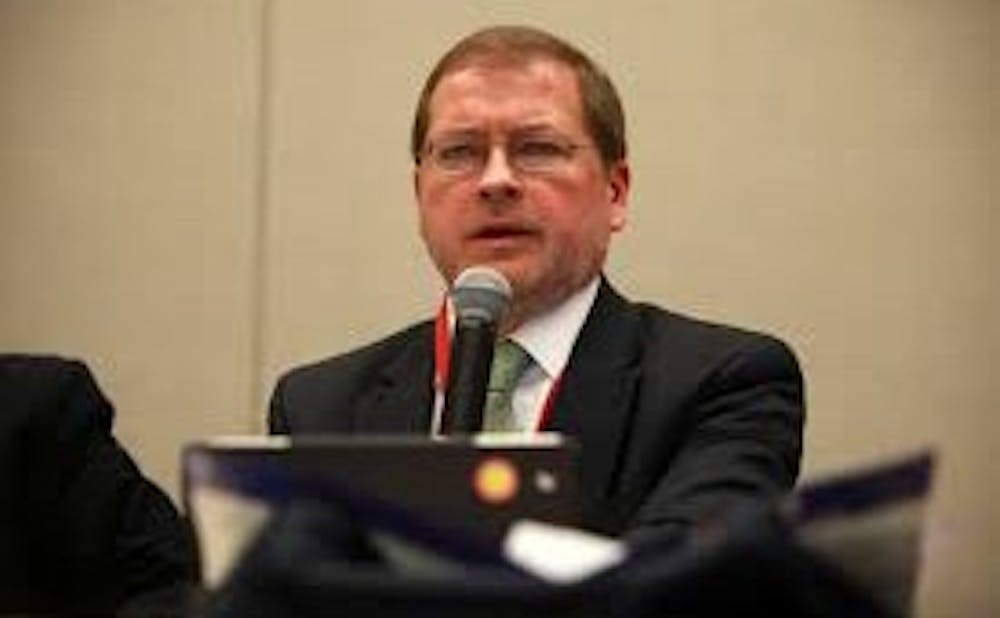The government has run amok in its abuse of control, says political advocate Grover Norquist.
Norquist, founder and president of Americans for Tax Reform, spoke at Duke Thursday evening at an event moderated by Fritz Mayer, professor in the Sanford School of Public Policy and director for Center for Political Leadership, Innovation and Service.
Norquist argued that Americans no longer have legitimate, complete agency over the direction of their lives.
“If we limit taxes, it limits the size, scope, and damage government can do,” he said.
Growing up in suburban Massachusetts, Norquist knew from a young age that governmental policy mattered. In addition, he recognized the potency of the United States in global affairs and thus saw an opportunity to effect change across the globe.
“I grew up in the middle of the Cold War, and we were playing for keeps," he said. "If I had grown up in Belgium, it wouldn’t have mattered, as Germany would have eaten us, but here in the States, things matter. We need to get it right. We’re shooting real bullets, and we can affect the entire world.”
Norquist characterized his nascent political philosophy as broadly anti-communist. But as an undergraduate at Harvard College, he says he understood the genuine threat to liberty—taxation.
“I didn’t have a key strategy,” he said. “But I knew taxes would be central.”
Norquist said he believes strongly in individualism—the right of humans to eschew the state and to pursue whatever they desire.
After graduation, Norquist assumed as positions as executive director of the College Republicans and then the National Taxpayers Union. It was during this time that he crafted a creed he would eventually gain fame for—the Taxpayer Protection Pledge, which declares one's opposition to all net tax increases.
Initially, Norquist drew the ire of conservatives. However, with the backing of then-President Ronald Reagan, who utilized the pledge as the framework of his bipartisan 1986 tax reform bill, the TPP’s popularity soared.
In the 1988 electino, all but one of the Republican presidential nominees had signed the TPP. Then-House Minority Whip Newt Gingrich asserted the TPP was central to his Contract with America in Republicans’ reclamation of the House of Representatives in 1994.
Generally, Norquist derided the insertion of government into most facets of civilian life. He lamented the lack of free-market opportunities for entrepreneurs, particularly chastising the preponderance of paperwork required to start a new business. He decried the militarization of police, as in the killing of Eric Garner for selling unpackaged cigarettes.
Above all else, Norquist said, the government must “do no harm and respect the lives of individuals.”
Insofar as taxes, Norquist advocated for as vast a reduction as possible, such as a return to the colonial levels of about two percent of one’s income. When questioned about the ensuing ballooning of the deficit, Norquist said that politicians must spend less across the board rather than increasing taxes.
He suggested that they consider defunding the Environmental Protection Agency, Department of Education and other unnecessary bureaucracies, according to his description. Norquist also advised officials to slash direct entitlements like Social Security and Medicare, replacing them with an automatic 401(k) plan for each citizen.
Norquist said that people could function adequately in lieu of government. He prided himself on his Republican identification, even though he says he disagreed sharply with the party on immigration and marijuana.
“The modern Republican Party has been branded as the party which won’t raise your taxes, which I fully support,” Norquist said.
Norquist said there is a clear correlation between a party’s willingness to adhere to fiscal conservatism and its chances on Election Day. He argued that the main reason former President George H.W. Bush lost his reelection campaign and former Presidents Bill Clinton and Barack Obama lost their first midterms was a tax hike.
He did not explain why President Donald Trump’s party, despite lowering taxes in 2017, lost forty seats in the House last November. He acknowledged that “the president is off to a good start” economically, but he said he believed fully that the key to Trump’s reelection bid would be more reduction of taxes.
“[Not raising taxes] ought to be good for 45 percent of the vote, and then kissing babies and shaking hands should secure the victory," Norquist said.
After his conversation with Norquist, Mayer opened the floor to questions. Senior Paul Forrester asked about Norquist’s thoughts on a universal basic income. The author quickly rejected proposal, saying it would extinguish any incentive to work. Norquist then discussed the Green New Deal, announced recently by Rep. Alexandria Ocasio-Cortez (D-NY), and he expressed his dismay at the notion that people unwilling to labor would still receive benefits. Norquist backed Maine’s welfare system, which mandates that all single able-bodied men work.
Senior Connor Vasu then asked about Norquist’s stance on immigration, saying that the current Republican platform of augmenting border security is antithetical to a free market. Norquist agreed with Vasu, saying that “lower taxes, open immigration, and respect for property made us prosperous."
Get The Chronicle straight to your inbox
Signup for our weekly newsletter. Cancel at any time.

